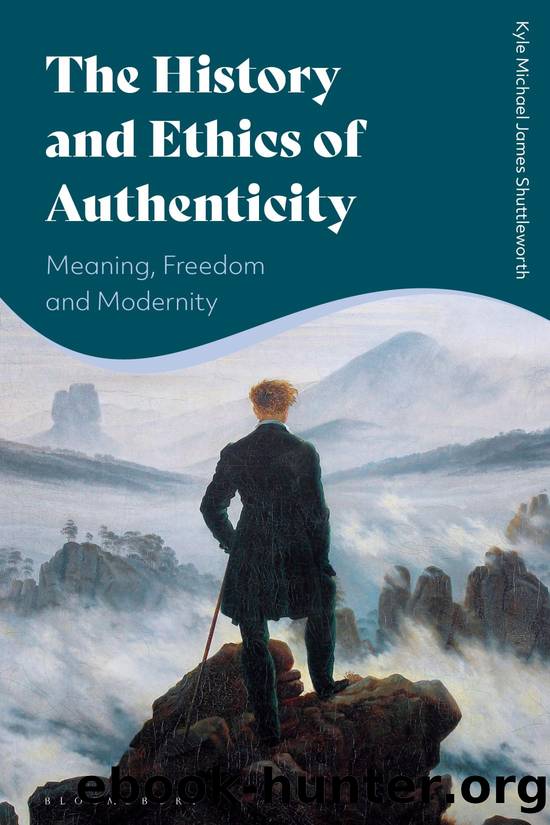The History and Ethics of Authenticity: Meaning, Freedom, and Modernity by Kyle Michael James Shuttleworth

Author:Kyle Michael James Shuttleworth [Shuttleworth, Kyle Michael James]
Language: eng
Format: epub
Tags: Philosophy, Ethics & Moral Philosophy, Social, Movements, Existentialism, Phenomenology, Political
ISBN: 9781350163454
Google: cgH7DwAAQBAJ
Publisher: Bloomsbury
Published: 2020-11-12T21:52:02+00:00
5
Is the âselfâ a fiction?
A second and very different response to the problems of modernity can be found within the thought of Michel Foucault. Whilst Habermas sought to return to the Enlightenment project, with the intention of completing it, Foucault seeks to overcome the Enlightenment project, rather than repair a fragmented framework. The Habermasian perspective was that communicative rationality possessed unfulfilled potential; for Foucault, on the other hand, discourses of power have penetrated every aspect of modern life and made individuality impossible. Unlike Habermas, Foucault accepts the consequences of the Enlightenmentâs failure to establish a rational end to human action. The consequence for Foucault is that the promise of increased freedom was not delivered, but that the sense of individuality which supposedly emerged was a myth. Although we believe ourselves to possess the potential of self-determination, Foucault claims that we are subjected to discourses of power which produce truth and determine how we conceive of ourselves. However, rather than resigning in vain to a pessimistic fate, it will be suggested that Foucaultâs approach is to seek out a method of self-creation which has not been subjected to discourse. In order to achieve this aim, he turns to pre-modernity where he discovers the ethic of care which was championed by the Stoics and which he believes provides the means to combat the subjection of modern subjects. However, although Foucault focuses on self-creation, he does not say anything substantial about meaning but instead offers an empty aesthetic.
This chapter will begin with an analysis of Foucaultâs account of modernity (Section 5.1). Here we will explicate his claim that the Enlightenment, which promised increased freedom, in fact led to subjection, with institutions creating subjects through discourses of power. Although a response to this problem can be found within Foucaultâs later work, we will question the continuity of his oeuvre (Section 5.2). In this section we will illustrate that the concept of power devised in his early work prevents any form of resolution, and that he must modify this to provide a constructive account. It will also be claimed that thinking in terms of power relations enables us to develop a more refined understanding of authenticity, which will become useful later in our book. Having resolved the tension in Foucaultâs account, we will then proceed to discuss his response to subjection (Section 5.3). Here we will turn to his ethical analysis of pre-modernity and his argument that we ought to appropriate the Stoic-inspired âcare of the selfâ. With an adequate understanding of Foucaultâs resolution, we will then argue that in comparison with socio-existential authenticity, Foucauldian care is an inferior ethic (Section 5.4). Although Foucault quite explicitly engages with the problem of freedom, he does not satisfactorily address this issue. In order to determine whether he provides an adequate response to the problem of meaning we will question whether his idea of turning oneâs life into a work of art can fulfil this role.
Download
This site does not store any files on its server. We only index and link to content provided by other sites. Please contact the content providers to delete copyright contents if any and email us, we'll remove relevant links or contents immediately.
| Deconstruction | Existentialism |
| Humanism | Phenomenology |
| Pragmatism | Rationalism |
| Structuralism | Transcendentalism |
| Utilitarianism |
The remains of the day by Kazuo Ishiguro(8950)
Tools of Titans by Timothy Ferriss(8347)
Giovanni's Room by James Baldwin(7301)
The Black Swan by Nassim Nicholas Taleb(7088)
Inner Engineering: A Yogi's Guide to Joy by Sadhguru(6776)
The Way of Zen by Alan W. Watts(6578)
Asking the Right Questions: A Guide to Critical Thinking by M. Neil Browne & Stuart M. Keeley(5741)
The Power of Now: A Guide to Spiritual Enlightenment by Eckhart Tolle(5726)
The Six Wives Of Henry VIII (WOMEN IN HISTORY) by Fraser Antonia(5488)
Astrophysics for People in a Hurry by Neil DeGrasse Tyson(5170)
Housekeeping by Marilynne Robinson(4420)
12 Rules for Life by Jordan B. Peterson(4292)
Double Down (Diary of a Wimpy Kid Book 11) by Jeff Kinney(4252)
The Ethical Slut by Janet W. Hardy(4233)
Skin in the Game by Nassim Nicholas Taleb(4224)
Ikigai by Héctor García & Francesc Miralles(4219)
The Art of Happiness by The Dalai Lama(4116)
Skin in the Game: Hidden Asymmetries in Daily Life by Nassim Nicholas Taleb(3976)
Walking by Henry David Thoreau(3941)
